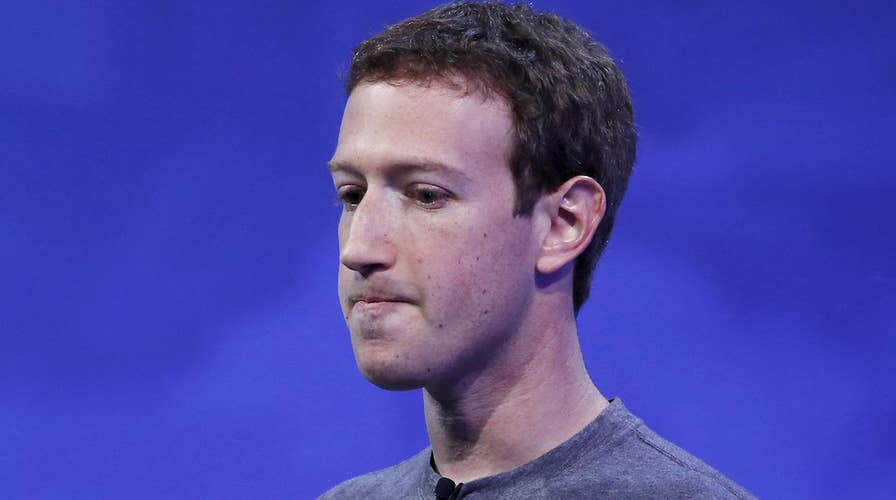Facebook's Zuckerberg admits to 'major breach of trust'
Facebook CEO is 'sorry' for the data-use scandal. William La Jeunesse reports.
We now know that the political consulting firm Cambridge Analytica harvested data from 50 million Facebook users by using a personality test app. The information was used to help Republican presidential contender Sen. Ted Cruz of Texas to target voters, and the data was later used on behalf of the Trump campaign to develop profiles of potential voters.
The problem is that Cambridge Analytica stands accused of violating its contract with Facebook and misrepresenting the purpose of some of its data mining. It is alleged not to have deleted data when requested to do so by Facebook. Lawsuits are no doubt in the works.
A contract breach would make what Cambridge Analytica did different from what political campaigns have done for years – use analytics to properly target potential voters. But that doesn’t mean that what other campaigns have done to exploit data isn’t eye popping.
For example, according to tech guru Sasha Issenberg, the 2012 Obama campaign used the same permission structure of Facebook to gain access to data on the friends of people who used their Facebook profiles to log onto an Obama campaign website. Using this data, Issenberg says the Obama campaign created “a new political currency that predicted the behavior of individual humans. The campaign didn’t just know who you were; it knew exactly how it could turn you into the type of person it wanted you to be.”
The manipulation of social media data by political players was viewed as benign when it was used to elect President Obama. But now that it’s perceived that President Trump may have benefitted from similar behavior, the pitchforks are out and the mob is ready to storm the Facebook castle. Writing new government regulations is the demand of the day.
“You’ve created these platforms, and now they’re being misused, and you have to be the ones to do something about it. Or we will,” Democratic Sen. Dianne Feinstein of California warned Facebook. “It’s clear these platforms can’t police themselves.”
Fellow Democratic Sen. Amy Klobuchar of Minnesota introduced the Honest Elections Act, a bill to create regulatory rules she says would block foreign interference from social media trollers from Russia and other adversaries. Klobuchar dismisses Facebook’s efforts to police itself as meaningless: “They say ‘trust us,’” she says.
Certainly, Facebook can be faulted for putting its head in the sand and not revealing what it learned about Cambridge Analytica’s behavior after the 2016 elections. Unlike recent Internet security scandals, such as those involving Target stores or the federal Office of Personnel Management, no personal financial or identifying data was stolen.
Cambridge Analytica scooped up data on who people’s Facebook friends were and what they liked. By declining to blow the whistle on Cambridge Analytica’s alleged behavior, Facebook made the scandal worse.
Now Facebook will now be put through the same political wringer that Big Oil or other suddenly suspect companies are. Facebook will have to deal with investigations from the Federal Trade Commission and at least two state attorneys general.
In addition, the European Union is planning to consider a tax on digital ad revenue and the sale of digital data to third parties. California lawmakers are debating legislation that would establish a data protection authority that would request and use data. And the U.S. House Energy and Commerce Committee will soon call Facebook CEO Mark Zuckerberg to testify.
Zuckerberg didn’t help matters for his firm this week when he told an interviewer: “I actually am not sure we shouldn’t be regulated.” While he makes up his mind, he has proposed useful changes in policies, such as having Facebook ban any developer who has not agree to a thorough audit.
It is precisely when the media and politicians are baying that something – anything – must be done to address a scandal that thoughtful debate is necessary.
Look at Sen. Klobuchar’s benign-sounding Honest Elections Act. It would require the same disclosures for online political ads that now apply to broadcast ads. But it’s completely unclear if that would block entities such as the Kremlin-backed trolls who put up online ads during the 2016 election. The ads that the Kremlin trolls bought wouldn’t be considered political advertising because they didn’t explicitly support or oppose any candidate.
New regulations could help increase transparency. In Canada, Facebook users can click on a button and see all ads running on a Facebook page even if they are directed at someone else. But regulations could easily stifle political speech, which we’ve seen is a real problem everywhere from college campuses to corporate America.
The Internet Association, a group of tech companies, warns that “proposals that would hold platforms liable for advertisers’ claims could discourage platforms from carrying ads from individual citizens or legitimate groups that aren’t well known or established.”
Facebook and Congress will have to come to some understanding and level of trust on how to prevent future misuse of Big Data. But the worse policy response to the Cambridge Analytica scandal would be to adopt European-style data rules that will inhibit innovation, make the social media experience less accessible to consumers and not even prevent abuses.









































